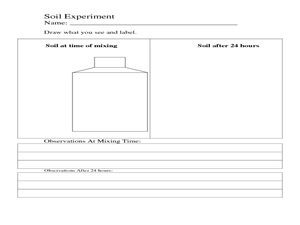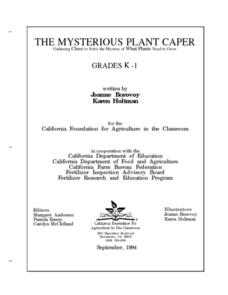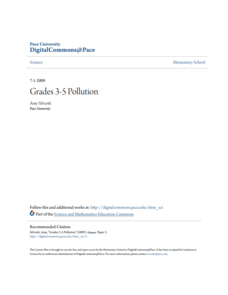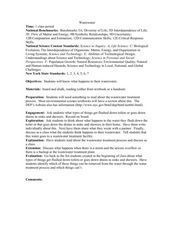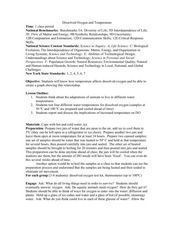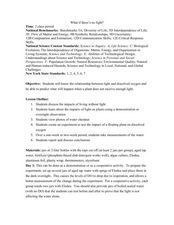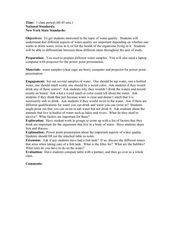Curated OER
IDENTIFYING AND SORTING BEARS
Students study the difference between living and nonliving bears by classifying pictures of bears and placing them on the appropriate posterboard. Given pictures of bears, students recognize types of bears by placing the pictures correctly.
Curated OER
The Needs of Living Things
Students investigate the global food chain by creating a visual chart. For this ecology lesson, students discover the elements needed for life to sustain itself, contrasting living things vs. non living things. Students fill in a...
Curated OER
Flower Power: Kansas Quarter Reverse
Young scholars examine the Kansas quarter reverse and explore the basic needs and life processes of plants. They take a nature walk around the school and draw living and non-living things. In the classroom the sort the specimens...
Concord Consortium
Oil and Water
If you don't get along with someone, it's said that the two of you are like oil and water. Why is this? Explore the phenomenon and explain the phrase in one resource! Science superstars first observe samples of oil and water together....
Curated OER
It's Alive! Or is it?
Students differentiate the characteristics of living and nonliving things. In this life science lesson, students compare and contrast robots and living things. Given an object, they decide whether it's is living or not and defend their...
Curated OER
Investigation 2 - Greenhouses
Third graders set up a miniature greenhouse to help them explain how nonliving things affect the growth of living things.
Curated OER
Vegetable Colors
In this vegetables learning exercise, students draw a label some green vegetables. Students then draw a label some non-green vegetables. Students then tell where non-green vegetables grow.
Curated OER
Extremophiles- Non-Fiction Reading Comprehension
In this extremophiles non-fiction reading learning exercise, students read a two page selection that describes the organisms known as extremophiles. They answer 10 questions based on the selection which include true or false, short...
Curated OER
Renewable vs. Non-Renewable Resources
Fifth graders, after brainstorming why conservation of resources is important, distinguish between renewable and non-renewable resources. They make a list of different types of natural resources on the board and then sort them into two...
Curated OER
What Is Life?
In this life characteristics worksheet, students answer 16 questions about living things, Redi's experiment, basic needs, growth and development.
Curated OER
Soil Composition
Students examine soil. In this soil composition lesson students participate in soil sedimentation and filtration activities. The students discuss what non-living and living things are in soil and why it is so important.
Curated OER
Under Our Feet
Students investigate the forest ecosystem to learn of the living and non-living elements of the soil. In this ecosystem instructional activity, students examine soil for twigs, moss, fungi, leaves, roots and other matter. Students...
Curated OER
The Mysterious Plant Caper
Students investigate the basic parts of plant and that plants are living things which require water, air, light and nutrients for survival. They do this through a series of scientific experiements and multi-curricular hands-on activities.
Curated OER
Parts of a Plant- Non-Fiction Reading Comprehension
In this parts of a plant non-fiction reading worksheet, students read 2 pages that describe the parts of a plant and their jobs. They answer 10 fill in the blank and 2 short answer questions based on the reading.
Curriculum Corner
Guest Teacher Plans (Grade 2)
Be prepared the next time you're in need of a substitute with a daily plan equipped with an assortment of activities covering subjects math, reading, word work, writing, and science.
K20 LEARN
It's Alive! Or, Is It?
Seems like a fairly simple question—until you begin asking your class! Get pupils acquainted with the characteristics of life through pairs classification, discussion, and scientific reading. The lesson plan, part of the K20 series, also...
Pace University
Pollution
Over the course of 10 days, scholars take a pre-assessment to place them in one of three leveled groups. Whole-class and in small groups, pupils take part in read-alouds, field trips, hands-on activities, and complete learning contracts...
Wild BC
Carbon - The Short and the Long
For this complex game about the carbon cycle, the playing field is divided into air, living, and earth zones. Children are assigned to be either plants or animals, and collect carbon tokens as they proceed from zone to zone. While the...
Curated OER
Wastewater
High schoolers discuss what happens to their wastewater. They read about the wastewater treatment process. Students are asked what types of things get flushed down toilets or goes down drains in sinks and showers. They are taught what...
Curated OER
Dissolved Oxygen and Temperature
Young scholars are shown how temperature affects dissolved oxygen and they create a graph showing this relationship. They think about the adaptations of animals to live in different water temperatures. Students test four different water...
Curated OER
What If There's No Light?
students discuss the importance of light and the consequences of living without it. Using a plant as a demonstration, students predict and observe what happens to a plant when it does not receive enough light. In groups, they experiment...
Curated OER
Water Quality with Samples
Students recognize whether one wants to drink water, swim in it, or for the health of the organisms living in it. They prepare different water samples to observe and collect samples regarding the water quality.
Curated OER
Looking at the Community Tree
Third graders review the characteristics of living and nonliving organisms. As a class, they observe a tree and describe the interactions between the living and nonliving organisms surrounding it. To end the instructional activity,...
Curated OER
Food Chain/Food Web
Students explore ecosystems. In this ecology lesson, students read an article explaining ecosystems. Students create a visual organizer with index cards using components of various ecosystems.
Other popular searches
- Non Living Things
- Non Living Organisms
- Non Living Things
- Laving and Non Living Things
- Lving and Non Living Things













